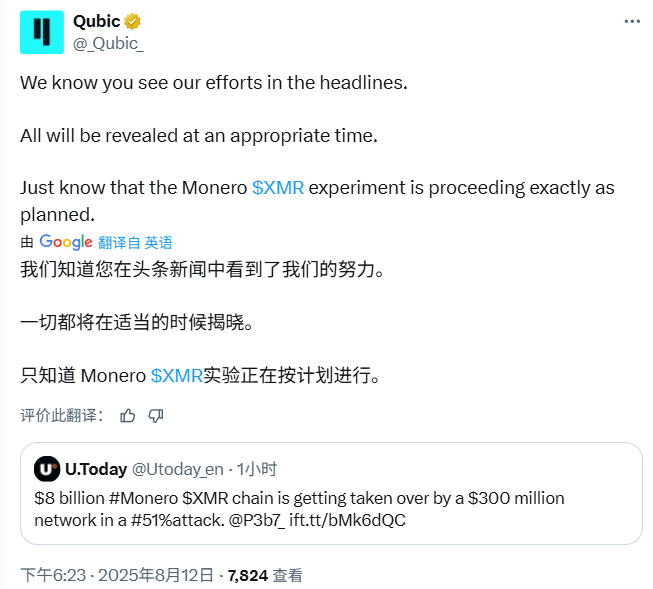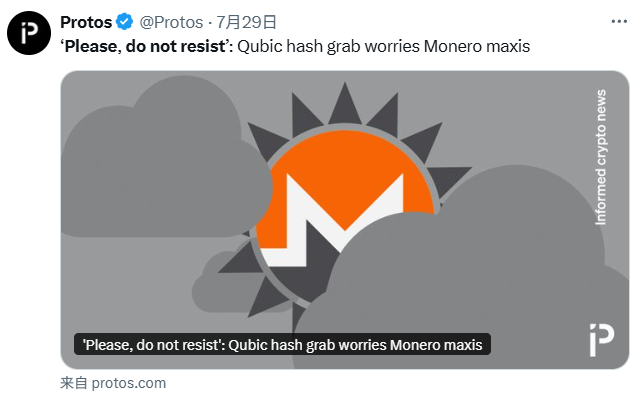撰文:Oliver,火星财经
在加密世界日新月异的叙事洪流中,有些名字似乎已淡出聚光灯的中心。门罗币(Monero)便是其中之一。作为 2014 年便已问世的「活化石」级项目,它不像 DeFi 协议那样许诺惊人的收益率,也不像 NFT 或 Meme 币那样能轻易点燃社交媒体的狂热。多年来,门罗币如同一位沉默的匠人,始终专注于其最初的使命——打造一套真正无法追踪、无法链接的数字现金系统。它的发展不追求朝夕之功,而在于对隐私技术的持续打磨和对网络韧性的不断加固。
然而,这份执着也让整个隐私赛道行走于刀锋之上。随着全球监管的收紧,隐私币种成了合规的「头号公敌」。各大主流交易所纷纷将其下架,以规避潜在的法律风险。在外界看来,隐私赛道面临的挑战主要来自监管机构的外部压力。然而,谁也未曾料到,一场更具颠覆性的危机,竟会从加密世界的内部爆发,其矛头直指这个赛道中最具代表性的旗手。
2025 年 8 月 12 日,新兴的 Layer 1 项目 Qubic 在社交媒体上发布了一则简短但信息量巨大的声明:「门罗币(XMR)实验正按计划顺利进行,一切都会在适当的时候揭晓。」 这条推文如同一声惊雷,将门罗币正遭受的、近乎致命的网络算力危机公之于众,并毫不避讳地将自己与这场风暴关联起来。这究竟是一次鲁莽的炫技,一场蓄意的攻击,还是一场旨在揭示行业沉疴的「社会实验」?要解开这个谜团,我们必须将目光投向风暴的策划者。

这场风暴的背后,是一位在加密行业留下过深刻印记的人物——Sergey Ivancheglyo(社区人称 CfB)。他的名字总是与颠覆式创新捆绑在一起。从早期为 NXT 项目开创性地引入纯粹的 PoS(权益证明)共识,到后来作为 IOTA 的核心力量,将「有向无环图」(DAG)这一突破性技术推向公众视野,Ivancheglyo 的职业生涯本身就是一部挑战现有范式的历史。他与 IOTA 基金会的分道扬镳,以及后续围绕此事的公开争论,更凸显了他倾向于在传统组织框架之外,以更纯粹、更不受约束的方式实现其技术愿景的行事风格。Qubic,便是他这种风格的延续——一个旨在从根本上重新定义 PoW(工作量证明)价值的最新尝试。
「有用」的算力与「经济攻击」
Qubic 的核心理念是「有用工作量证明」(Useful Proof of Work, uPoW)。传统 PoW,如比特币所使用的,矿工通过解决无实际意义的哈希谜题来维护网络安全,这被认为是一种巨大的能源浪费。而 Qubic 则试图让这些算力变得「有用」,将其引导至 AI 训练、科学计算等领域。他们的系统允许矿工在执行这些 AI 任务的同时,通过一种名为「外包计算」的机制,将其部分算力指向其他 PoW 网络进行挖矿,门罗币便是他们的第一个目标。
这套机制的精妙之处在于它创造了一种强大的经济激励。Qubic 矿工在获得其原生代币 QUBIC 奖励的同时,还能额外获得门罗币挖矿的收益。更具颠覆性的是,Qubic 官方将挖来的 XMR 在公开市场上出售,用所得资金回购并销毁 QUBIC 代币,制造通缩压力,从而推高 QUBIC 的价格。一个危险的飞轮就此形成:更高的 QUBIC 价格吸引更多矿工加入,更多的矿工意味着更强的算力,更强的算力能挖到更多的 XMR,卖掉 XMR 又能进一步推高 QUBIC 价格。
这并非传统的算力攻击,而是一种「经济攻击」。Qubic 并非试图通过双花攻击直接窃取资金,而是利用更优越的经济模型,像一个巨大的磁铁,将原本分散的门罗币算力吸附到自己周围。正如 Protos 媒体分析的那样,这是一种「温水煮青蛙」式的威胁,它腐蚀的是门罗币去中心化的根基。
兵临城下:门罗币社区的反击
当 Qubic 的算力在门罗币网络中的占比从 7 月中旬的 25% 一路飙升,并在 8 月 12 日触及 48-50% 的临界点时,门罗币社区感受到了切实的寒意。慢雾(SlowMist)创始人余弦在社交媒体上证实:「从技术上讲,Qubic 对门罗币的 51% 攻击已经成功。」尽管 Qubic 并未发起双花,但网络的安全天平已被彻底打破。
51% 攻击对 PoW 链来说是悬顶的达摩克利斯之剑。历史上,以太坊经典(ETC)在 2019 年因此被双花盗取了价值 110 万美元的资产,而比特黄金(BTG)更是在 2018 年的一次攻击中损失高达 1800 万美元。The Block 引用分析师的估算称,一个恶意行为者仅需花费「每天 7000 到 10000 美元」,就可能租用到足够的算力来控制门罗币网络。Qubic 的「实验」无疑是将这一理论上的风险活生生地展现在了世人面前。
面对兵临城下的局面,这个以「隐私」和「抗审查」为图腾的社区爆发出惊人的凝聚力。一场自下而上的「算力保卫战」迅速打响。社区成员在 Reddit 等社交平台上奔走相告,呼吁所有忠诚的矿工将算力从未知矿池撤出,转移到 p2pool(一种去中心化矿池)或 supportxmr.com 等信誉良好的防御性矿池中。
这场反击的核心,是削弱 Qubic 经济模型的根基。主流挖矿软件 XMRig 的开发者 Sergei Chernykh 虽然否认了对 Qubic 发动 DDoS 攻击的指控,但他明确表示,社区正在探索「完全合法的反制措施」。这背后,是一场关于网络灵魂的争夺。
「请不要反抗」:哲学、狂妄与未来
在 Qubic 官方发布的「第 172 周期回顾」博文中,他们以一种近乎上帝视角的口吻,复盘了这场「实验」的全过程,甚至记录了他们如何开启「自私挖矿」模式以应对社区的反击。而其创始人 Ivancheglyo 在社区中的一句回应,更是将事件的戏剧性推向高潮:「Please, do not resist.」(请不要反抗。)

这句话充满了挑衅,但也揭示了 Qubic 行为背后更深层次的哲学思考。在 Ivancheglyo 和他的支持者看来,如果一个 PoW 网络能轻易被一个更优越的经济系统在算力上压制,那么问题出在这个网络本身的设计上,它在「进化论」意义上是不适应的。Qubic 的「实验」,便是一场检验 PoW 网络「免疫力」的压力测试。他们认为自己并非破坏者,而是揭示真相的「吹哨人」,迫使行业正视 PoW 机制在经济激励层面可能存在的脆弱性。
这无疑触及了加密世界的核心议题:去中心化的本质究竟是什么?是算力在物理上的绝对分散,还是一个能够抵御外部经济侵蚀的、更具韧性的共识模型?门罗币的 RandomX 算法,旨在抵抗 ASIC 矿机,以实现 CPU 挖矿的公平化,其初衷正是为了维护去中心化。但 Qubic 的出现证明,即使在硬件层面做到了极致的去中心化,基于经济激励的算力中心化依然是一个无法回避的威胁。
此次事件的影响是深远的。它为所有 PoW 项目敲响了警钟,尤其是那些市值较小、算力安全壁垒不高的项目。单纯依靠技术上的精巧设计可能不足以应对来自外部的、更高效经济体的「降维打击」。未来的公链竞争,或许不仅仅是技术和生态的竞争,更是经济模型和激励机制的博弈。
最终,在门罗币社区的顽强抵抗和舆论的巨大压力下,Qubic 的算力占比有所回落。这场没有硝烟的战争暂时告一段落。但 Qubic 所提出的问题,依然悬而未决。它像一面镜子,照出了 PoW 世界深处的光荣与隐忧。这场由一个天才开发者发起的、充满争议的「实验」,或许不会是最后一次。当下一个更强大的「Qubic」出现时,又有谁能保证自己不会成为下一个「门罗币」?这场关于算力、主权和生存的博弈,才刚刚开始。
免责声明:本文章仅代表作者个人观点,不代表本平台的立场和观点。本文章仅供信息分享,不构成对任何人的任何投资建议。用户与作者之间的任何争议,与本平台无关。如网页中刊载的文章或图片涉及侵权,请提供相关的权利证明和身份证明发送邮件到support@aicoin.com,本平台相关工作人员将会进行核查。




